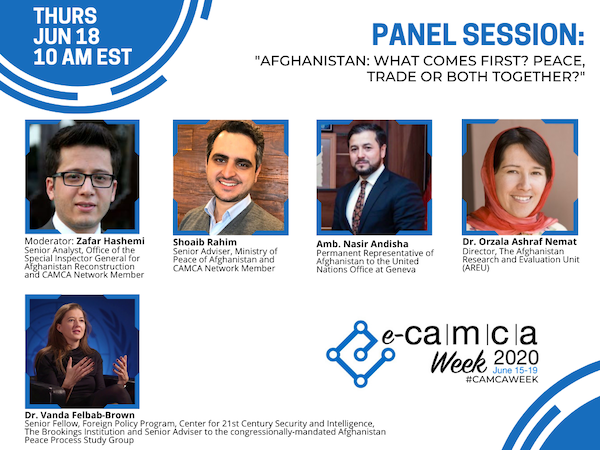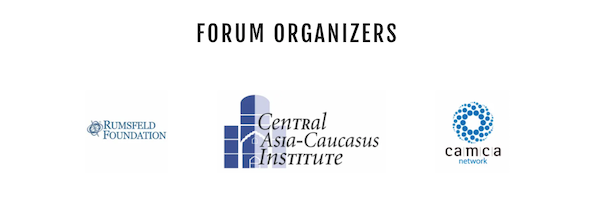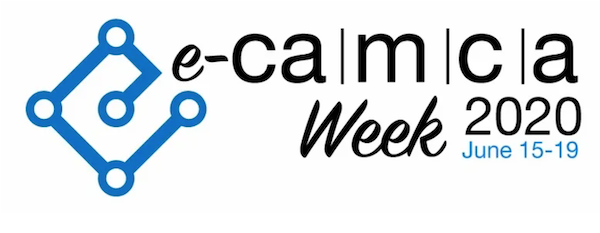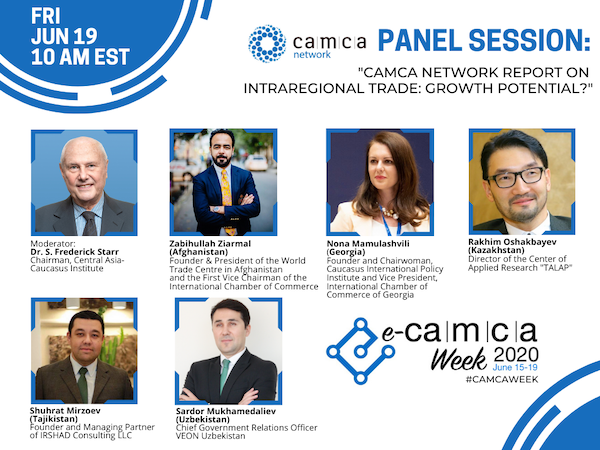2021 e-CAMCA REGIONAL FORUM
e-CAMCA 2021 Regional Forum
Meet the talented speakers for each of our Forum panels below!
We are honored to have 30 distinguished panelists and moderators joining us next week from across the CAMCA region and beyond. Our panels are comprised of CEOs, CFOs, Chairmen, Directors, Senior Fellows, Acting Presidents, Deputy Ministers, Director Generals, Founders and more. We look forward to hearing their important insights surrounding this year's theme: "Economic Prospects of the CAMCA Region."
Learn more about the members of the CAMCA Network featured throughout our panels here.
(All times EST)
MONDAY, JUNE 21st
9:45-10:00 AM
“New Opportunities Across CAMCA” - Welcome & Remarks by Dr. Svante Cornell Director, Central Asia-Caucasus Institute, American Foreign Policy Council
10:00-11:00 AM
Panel Discussion - “New Regionalism in Central Asia and Its Challenges”
Moderator:
Dr. S. Frederick Starr, Chairman, Central Asia-Caucasus Institute, AFPC
Speakers:
Dennis de Tray, Board Member and Adviser to the President, Nazarbayev University
Dr. Subir Lall, Deputy Director, Middle East and Central Asia Department, IMF
Dr. Eldor Aripov, Director, Institute for Strategic and Regional Studies under the President of the Republic of Uzbekistan
Dr. Taleh Ziyadov, Director General, Baku International Sea Trade Port, Azerbaijan
Aziza Umarova, Co-Founder, SmartGov Consulting; CAMCA Network Member, Uzbekistan
TUESDAY, JUNE 22nd
9:00-9:45 AM
Keynote Interview with Dr. Sergei Guriev, Professor of Economics & Scientific Director of the Master and PhD programmes in Economics, Sciences Po
Interviewer:
Rakhim Oshakbayev, Director, Center of Applied Research “TALAP”; CAMCA Network Member, Kazakhstan
10:00-11:00 AM
Panel Discussion - “U.S. Withdrawal from Afghanistan: What Does it Mean for Political and Economic Alignments in the Region?”
Moderator:
Michael Doran, Senior Fellow, Hudson Institute
Speakers:
Dr. Omar Sharifi, Country Director, American Institute of Afghanistan Studies; Assistant Professor of Social Sciences, American University of Afghanistan; CAMCA Network Member
Ikram Sehgal, Chairman, Pathfinder Group; Chairman, Karachi Council on Foreign Relations
Amb. Gautam Mukhopadhaya, Senior Visiting Fellow, Centre for Policy Research in New Delhi; former Ambassador of India to Afghanistan (2010-2013)
Alex Vatanka, Director of Iran Program and Senior Fellow, Frontier Europe Initiative, Middle East Institute
Iskander Akylbayev, Executive Director, Kazakhstan Council on International Relations; CAMCA Network Member
WEDNESDAY, JUNE 23rd
9:00-9:45 AM
Keynote Interview with Secretary Carlos Gutierrez, Chairman & CEO, EmPath; Former U.S. Secretary of Commerce
Interviewer:
Samiullah Mahdi, Award-winning journalist and lecturer at Kabul University; CAMCA Network Member, Afghanistan
10:00-11:00 AM
Panel Discussion - “Impediments to Foreign Investments in CAMCA: Real or Imaginary?”
Moderator:
Gaukhar Nurgalieva, Senior Advisor, FMA; CAMCA Network Member, Kazakhstan
Speakers:
Yernar Zharkeshov, Principal and Head of Eurasia, Whiteshield Partners; CAMCA Network Member, Kazakhstan
Yusif Abdullayev, Acting President of Azerbaijan Export and Investment Promotion Foundation (AZPROMO)
Dulguun Baasandavaa, Deputy Chairman, National Development Agency of Mongolia; CAMCA Network Member
Baurzhan Kankin, Chairman, Social Entrepreneurship Corporation “Shymkent”
THURSDAY, JUNE 24th
9:00-9:45 AM
Keynote Interview with Saad Mohseni, Chairman & CEO, MOBY Group, Afghanistan
Interviewer:
Ali Aslan, International TV Presenter & Journalist Zoom
10:00-11:00 AM
Panel Discussion - “Will a New Entrepreneurial Class Drive CAMCA Economies?”
Moderator:
Zabihullah Ziarmal, Director General, Afghanistan National Standard Authority; Chairman, World Trade Centre Kabul Afghanistan; CAMCA Network Member
Speakers:
Valeri Chekheria, Serial entrepreneur and hotelier; Founder and CEO of Hospitality Projects; Adviser to the Minister of Economy and Sustainable Development of Georgia
Abdullo Kurbanov, Co-founder and CEO, Alif Bank; CAMCA Network Member, Tajikistan
Khulan Davaadorj, Founder, Director and Chief Technologist, LHAMOUR LLC; CAMCA Network Member, Mongolia
Aziz Soltobaev, Founder, KG Labs Public Foundation; CAMCA Network Member, Kyrgyzstan
Abdulahad Badghisi, General Manager, Samarkand Bukhara Silk Carpet JV
FRIDAY, JUNE 25th
9:00-9:45 AM
Keynote Interview with Douglas Becker, Founder & Chairman, CINTANA Education; Board Chair, International Youth Foundation
Interviewer:
Dr. Mamuka Tsereteli, Senior Fellow, Central Asia-Caucasus Institute, AFPC
10:00-11:00 AM
Panel Discussion - “Can Education Systems of CAMCA Countries Adjust to New Labor Market Demands?”
Moderator:
Yernar Zharkeshov, Principal and Head of Eurasia, Whiteshield Partners; CAMCA Network Member, Kazakhstan
Speakers:
Dr. Shamsh Kassim-Lakha, Chairman of the Board of Trustees, University of Central Asia
Fariz Ismailzade, Executive Vice Rector, ADA University, Azerbaijan
Hikmat Abdurahmanov, Co-founder and CEO, TEAM University; Co-founder, HMPARTNERS; CAMCA Network Member, Uzbekistan
Talant Sultanov, Co-founder and Chair, Kyrgyz Chapter of the Internet Society; CAMCA Network Member, Kyrgyzstan
Dr. Irakli Laitadze, Chief Financial Officer, GMT Mtatsminda; Lecturer at Ilya State University in Tbilisi; CAMCA Network Member, Georgia
[VIDEO POSTED] CAMCA Forum Event: Constitutional Reform in Kyrgyzstan: Step Forward, or Step Backward?
Constitutional Reform in Kyrgyzstan: Step Forward, or Step Backward?
Co-organized by the Central Asia-Caucasus Institute, the CAMCA Network and Rumsfeld Foundation
With the October 2020 elections and the political turbulence which preceded and followed them, the Kyrgyz Republic has embarked on major constitutional reforms. These events are taking place amidst the COVID pandemic and eroded social and economic conditions. Our expert panel assessed these developments and suggested alternative outcomes.
Speakers:
Talant Sultanov, Founder and the Chair of the Kyrgyz Chapter of the Internet Society and Expert at the Center for Strategic Initiatives; CAMCA Network Member
Mirsuljan Namazaliev, Founder and Managing Director of the CAFMI Research Center; Political and Campaign Manager; CAMCA Network Member
Johan Engvall, Senior Research Fellow, the Central Asia-Caucasus Institute & Silk Road Studies Program; Researcher, Swedish Institute of International Affairs
Azim Azimov, Founder and CEO of Media Kitchen; CAMCA Network Member
Moderator:
Dr. S. Frederick Starr, Chairman, Central Asia-Caucasus Institute at American Foreign Policy Council
When: Wednesday, April 28, 2021
The event was livestreamed on Zoom and is now available on Youtube.
[VIDEO POSTED] CAMCA Forum Event: Kyrgyzstan - Plenty of Symptoms, but What's the Disease and How to cure it?
Kyrgyzstan - Plenty of Symptoms, but What's the Disease and How to Cure it?
A joint event of the Central Asia-Caucasus Institute, the CAMCA Network and Rumsfeld Foundation
Moderator :
- S. Frederick Starr, Chairman, Central Asia-Caucasus Institute
Speakers:
- Azim Azimov, Founder and CEO of Media Kitchen; Political Commentator; CAMCA Network Member
- Dr. Almazbek Beishenaliev, Minister of Education and Science of the Kyrgyz Republic; Director of the Regional Institute of Central Asia in Bishkek; CAMCA Network Member
- Zarina Chekirbaeva, Candidate for the Parliament of the Kyrgyz Republic from “Bir Bol” political party; Former Executive Director of the American Chamber of Commerce in Kyrgyzstan; CAMCA Network Member
- Dr. Johan Engvall, Researcher, Swedish Defense Research Agency;Senior Research Fellow, the Central Asia-Caucasus Institute & Silk Road Studies Program
- Talant Sultanov, Founder and the Chair of the Kyrgyz Chapter of the Internet Society; Expert at the Center for Strategic Initiatives in Bishkek; CAMCA Network Member
When: Wednesday, October 21, 2020 at 10am EDT
The event was live-streamed on the CACI Facebook page and is now available on Youtube.
CACI and the Rumsfeld Foundation hosted e-CAMCA Week 2020
In lieu of our in-person annual gathering, the CAMCA Regional Forum organizers are hosting a virtual e-CAMCA Week.
The June 2020 CAMCA Forum, to be held in Almaty, Kazakhstan, was postponed until June 2021. In its place, CACI and the Rumsfeld Foundation organized the e-CAMCA week of online events and publication. Find recordings of the e-CAMCA Week virtual events held over June 15th-19th at the CAMCA Forum YouTube Channel, as well a variety of original #CAMCAweek publications and resources for our CAMCA Forum community at www.camcaforum.org,.


E-CAMCA WEEK PUBLICATIONS
Welcome Letter
Letter from Secretary Donald Rumsfeld
e-CAMCA Week 2020 participants
Meet CAMCA Entrepreneurs
View features of some successful regional entrepreneurs from our CAMCA Network
"Caucasus & Central Asia Post COVID-19" Series- Volume I
Digital Transformation in the CAMCA Region
Post COVID-19: Challeges & Opportunities for the Region

CACI releases Silk Road Papers on State and Religion in Kyrgyzstan and Turkmenistan
Religion and the Secular State in Central Asia: The Examples of Kyrgyzstan and Turkmenistan

This event marked the publication of two Silk Road Papers on the state-religion relationships in Central Asia, a study of Kyrgyzstan by Johan Engvall and one on Turkmenistan by Victoria Clement. This forms part of the ongoing research effort on secular governance, religion and politics at the Central Asia-Caucasus Institute & Silk Road Studies Program Joint Center, and follows the publication of studies on Azerbaijan, Kazakhstan and Uzbekistan.
Johan Engvall’s study of Kyrgyzstan’s experience is timely given that country’s experience, starting with a more permissive atmosphere that subsequently aligned itself with policies in the rest of the region. Victoria Clement’s study of Turkmenistan is the first treatment of the subject to appear in print, and sheds light on the similarities of Turkmenistan’s approach with the rest of Central Asia as well as its specificities.
Speakers:
Victoria Clement, Eurasia Regional Analyst, Center For Advanced Operational Culture Learning, Marine Corps University
Johan Engvall, Senior Research Fellow, Foreign Policy Research Institute
Moderator: Svante E. Cornell, Director, Central Asia-Caucasus Institute at AFPC
When: Monday, June 15, 2020 at 10am EDT
The Event was live-streamed on our Facebook page and is available on our YouTube page and here.



